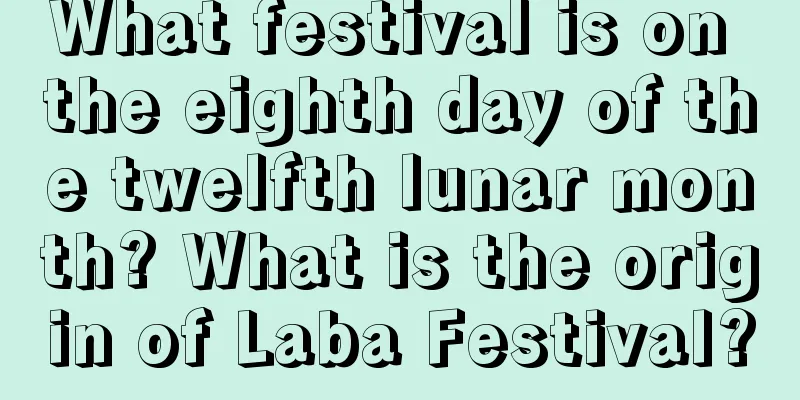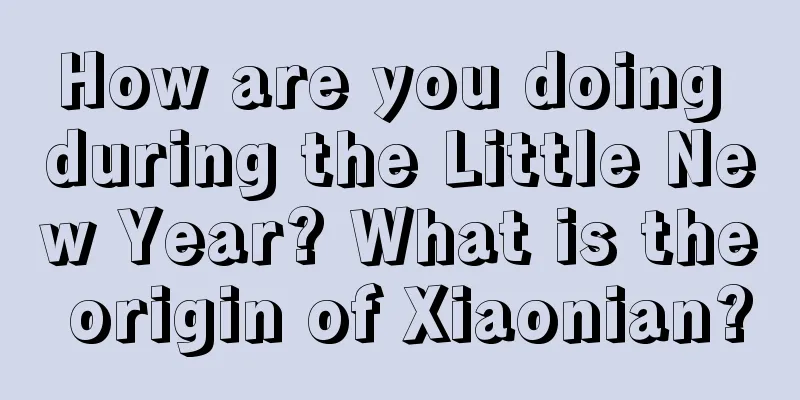What festival is on the eighth day of the twelfth lunar month? What is the origin of Laba Festival?

In a blink of an eye, we have reached the end of 2018. So what festival is on the eighth day of the twelfth lunar month? What is the origin of Laba Festival? What's the story? In the twelfth month of the lunar calendar, the coldest days of winter arrive as expected. Shuimoxiansheng.com presents you with wonderful content for the twelfth month of the lunar calendar in 2018.What festival is on the eighth day of the twelfth lunar month?The eighth day of the twelfth lunar month is commonly known as Laba Festival. Since ancient times, Laba has been a sacrificial ceremony for ancestors and gods (including door gods, household gods, house gods, kitchen gods, and well gods) to pray for a good harvest and good luck. According to the "Book of Rites: Suburban Sacrifices", the La Festival is "in the twelfth month of the year, when all things are gathered together and offered a feast." The La Day was called "Jiaping" in the Xia Dynasty, "Qingsi" in the Shang Dynasty and "Dala" in the Zhou Dynasty; because it was held in December, that month was called the La Month and the day of the La Festival was called the La Day. In the pre-Qin period, Laba Festival was on the third Xu day after the winter solstice. Later, when Buddhism was introduced, in order to expand its influence in the local area, it attached to traditional culture and designated Laba Festival as the day of Buddha's enlightenment. Later, as Buddhism became popular, the Buddha's Enlightenment Day was merged with the La Festival, and it was called the "Dharma Treasure Festival" in the Buddhist field. It was not until the Northern and Southern Dynasties that it was fixed on the eighth day of the twelfth lunar month.What is the origin of Laba Festival?1. Laba Festival is the eighth day of the twelfth lunar month. It originated in the late Yuan Dynasty and early Ming Dynasty. It is said that when Zhu Yuanzhang was imprisoned and suffering, it was a cold day. Zhu Yuanzhang, who was cold and hungry, actually dug out some red beans, rice, red dates and seven or eight kinds of grains from the rat hole in the prison. Zhu Yuanzhang cooked these things into porridge. Because that day was the eighth day of the twelfth lunar month, Zhu Yuanzhang named this pot of multi-grain porridge "Laba porridge". Enjoyed a delicious meal. Later, Zhu Yuanzhang pacified the world and became the emperor. In order to commemorate that special day in prison, he designated that day as Laba Festival and officially named the multi-grain porridge he ate that day as Laba porridge.2. The founder of Buddhism, Sakyamuni, was originally the son of King Suddhodana of Kapilavastu in northern ancient India (in present-day Nepal). Seeing that all living beings were suffering from birth, old age, sickness and death, and being dissatisfied with the theocratic rule of the Brahmins at the time, he gave up the throne and became a monk. He achieved nothing at first, but after six years of asceticism, on the eighth day of the twelfth lunar month, he attained enlightenment under the Bodhi tree and became a Buddha. During these six years of asceticism, he only ate one grain of hemp and one grain of rice every day. Later generations did not forget the suffering he endured, and ate porridge on the eighth day of the twelfth lunar month every year to commemorate him. "Laba" became the "Buddha's Enlightenment Day". "Laba" is a grand festival in Buddhism. Before liberation, Buddhist temples across the country held Buddha bathing ceremonies and chanting sessions, and imitated the legend of the shepherdess offering gruel to Sakyamuni before he attained enlightenment. They cooked porridge with fragrant grains and fruits to offer to the Buddha, which was called "Laba porridge." Laba porridge was given to disciples and believers, and it later became a folk custom. It is said that before the eighth day of the twelfth lunar month, monks in some temples would hold bowls and beg for alms on the streets. They would cook the collected rice, chestnuts, dates, nuts and other ingredients into Laba porridge and distribute it to the poor. It is said that after eating it one can get the blessing of Buddha, so the poor call it "Buddha porridge". |
<<: What is the lunar date of Laba Festival in 2019? What is the origin of Laba porridge?
Recommend
Is the weather still hot after Cold Dew? What changes will occur in the weather after the Cold Dew solar term?
The Cold Dew solar term belongs to the autumn seas...
Why do we appreciate the moon during the Mid-Autumn Festival? Is it a bad idea to get engaged on the second day of the Mid-Autumn Festival in 2020?
Introduction: There are many customs during the Mi...
Is the Dragon Raising its Head on the second day of the second lunar month in 2019 suitable for worshiping ancestors?
Is the second day of the second lunar month in 201...
Is the second day of the sixth lunar month in 2021 a suitable day for opening a business? Is it a good day?
The sixth lunar month is a short month with 29 day...
Can a company (store) open for business on April 15th of the lunar calendar in 2020?
Choosing a good day for opening can help companie...
Is it a good idea to get married on December 25, 2019? Is it an auspicious day?
The twelfth lunar month is beautiful because it is...
Is it a good idea to move house on the twelfth day of the Lunar New Year in 2021? What should I pay attention to when moving?
The first month of the lunar calendar in 2021, the...
What is the date of the third day of September in the Cold Dew solar term in 2021? Is it an auspicious day? Is it suitable for caesarean section?
"The swallows bid farewell and the swans fly ...
Query of the lucky god's position on December 11, 2018
The twelfth month of the lunar calendar is the en...
Is October 28, 2018 a suitable date for opening a new store?
The arrival of the tenth month of the lunar calen...
Is the lunar calendar date from March 8th to March 31st, 2020 suitable for moving and setting up beds?
Introduction: You need to choose an auspicious day...
Is the fate of a girl born on April 23rd of the lunar calendar in 2022 good?
Whether a girl's fate is good or not depends o...
Is October 19th of the lunar calendar in 2021 a good day? Is it suitable for decoration? Is it an auspicious day?
The Minor Snow solar term occurs in the tenth mont...
Analysis of the 23rd day of the eighth lunar month in 2021. Can the business be opened on that day?
There are certain considerations and rules when ch...
Is it a good time to renovate the day before the rain in 2021? When will the rain start and end?
Introduction: Generally, it is necessary to choose...









